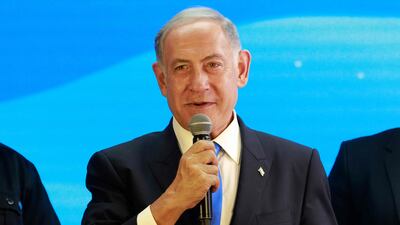Former Israeli prime minister and opposition leader Benjamin Netanyahu has called on Vladimir Putin to end Russia’s war in Ukraine.
During his time in office, Mr Netanyahu was widely regarded as having close ties to Mr Putin while expanding Israel-Russia trade, despite Russia’s alliances with Israel’s rivals Iran and Syria.
Mr Putin’s decision to go to war in Ukraine was “guided by his vision of reconstituting a great Russian realm”, Mr Netanyahu said. He hoped the Russian leader was “having second thoughts about it”, he said in an interview with USA Today.
“We all have sympathy to Ukraine, it’s not even a question, and I’m no different,” he said.
Mr Netanyahu has often spoken of Mr Putin as a “friend”. The two leaders closely coordinated during tensions arising from the Syrian war, when Israel began a bombing campaign against Iranian weapons in Syria despite the presence of Russian forces, who were backing Syrian leader Bashar Al Assad.
During a 2017 summit in Moscow, Mr Netanyahu released a statement on the two leaders' meetings which “reflect genuine friendship and a tightening of relations in economics, technology, tourism and culture, as well as the living bridge of the one million Russian speakers living in Israel”.
Since Mr Netanyahu left office last year, Israel has sought not to antagonise Russia in the Ukraine conflict, with ministers pointing to the importance of continuing military co-ordination over the skies of Syria, as well as Israel’s ties with Russia’s Jewish community.
Ukraine has been asking for more Israeli assistance, especially since Russia began purchasing and deploying drones from Iran, an important Israeli regional foe.
Israel has so far resisted calls from the US, Ukraine and others to supply Ukraine with offensive and defensive weapons, and has instead supported Ukraine with humanitarian aid, helmets and flak jackets.
Following public revelations that Russia is using Iranian drones in Ukraine, Israel’s defence minister, Benny Gantz, said Israel is “following Iran’s involvement in the war”. He said that Iran “may also provide additional advanced systems” to Russia in the near future.
Israel’s former prime minister, Naftali Bennett, had attempted to mediate between Russia and Ukraine in the early days of the conflict when he flew to Moscow to meet Mr Putin. Mr Bennett’s successor, Yair Lapid, has taken a more critical stance towards the invasion, drawing sharp criticism from Russia.

